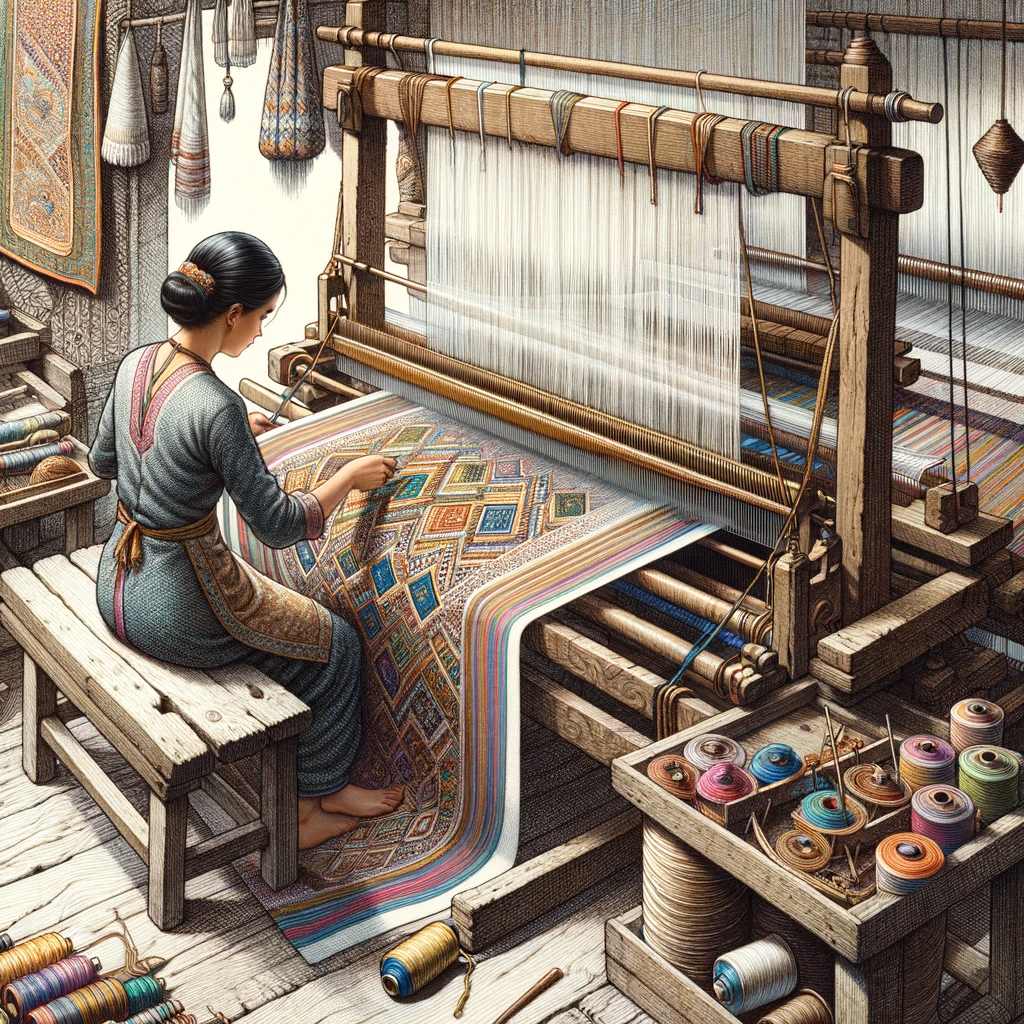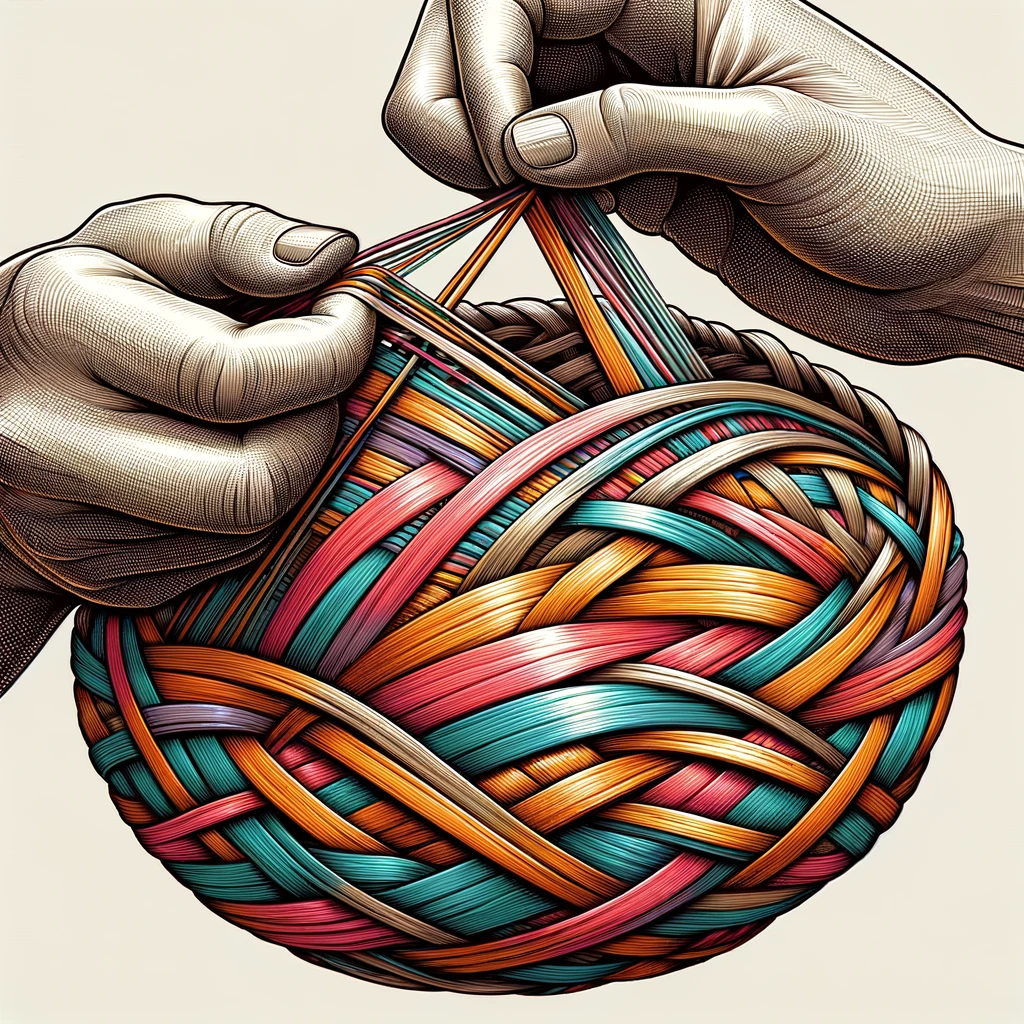Weave
Definition
To weave means to form (fabric or a fabric item) by interlacing long threads passing in one direction with others at a right angle to them.
Parts of Speech
- Verb (to weave)
- Noun
Pronunciation
American English
- IPA Pronunciation: /wiːv/
- Respelling: weev
British English
- IPA Pronunciation: /wiːv/
- Respelling: weev
In both American and British English, "weave" is pronounced with a long "ee" sound as in "see," followed by a "v" sound. The pronunciation is essentially the same in both versions of English.
Etymology
The term "weave" is derived from the Old English "wēfan", which means "to weave, bind, unite, or construct".
Derivatives
- Weaver
- Weaving
- Woven
- Weft
- Weave pattern
Synonyms
- Intertwine
- Knit
- Braid
Antonyms
- Separate
- Disentangle
- Unravel
Usage
"Weave" is commonly used in the context of fabric and textile production, but it can also metaphorically describe the act of combining various elements into a cohesive whole.
Related Terms
- Loom
- Yarn
- Warp
- Textile
- Tapestry
Detailed Definition
Verb (to weave)
- To form fabric by interlacing threads, yarns, strands, or strips of material.
- Example: She learned how to weave intricate patterns into the fabric.
- To combine various elements into a cohesive whole.
- Example: The author skillfully weaves multiple plotlines throughout the novel.
- To move in a winding or intricate pattern, typically to avoid obstacles.
- Example: The cyclist weaved through traffic effortlessly.
Noun
- Weave can also refer to a particular style or manner in which threads, yarns, or hairs are woven together.
- Example: The basket had a tight weave, making it durable and strong.
weave



🇨🇳 Mandarin (Simplified Chinese)
- 织 (zhī) [To create fabric]
- IPA: /ʈʂʐ̩˥/
- Respelling: zhr
- 编织 (biān zhī) [To interlace, metaphorically]
- IPA: /pjen˥ ʈʂʐ̩˥/
- Respelling: byen-zhr
🇮🇳 Hindi
- बुनना (bunnā) [To create fabric]
- IPA: /bʊn.naː/
- Respelling: boon-naa
🇪🇸 Spanish
- Tejer [To create fabric]
- IPA: /ˈtexeɾ/
- Respelling: TEH-hair
🇫🇷 French
- Tisser [To create fabric]
- IPA: /tise/
- Respelling: tee-SAY
🇦🇪 Modern Standard Arabic
- نسج (nasaj) [To create fabric]
- IPA: /nasad͡ʒ/
- Respelling: NA-saj
🇧🇩 Bengali
- তাঁত বোনা (tāṁt bonā) [To create fabric]
- IPA: /tãt̪ bona/
- Respelling: tant BAW-na
🇷🇺 Russian
- Ткать (Tkаt’) [To create fabric]
- IPA: /tkatʲ/
- Respelling: tkat
🇵🇹 Portuguese
- Tecer [To create fabric]
- IPA: /tɛˈseɾ/
- Respelling: te-SEHR
🇮🇩 Indonesian
- Menenun [To create fabric]
- IPA: /mənənun/
- Respelling: meh-NEH-noon
🇩🇪 German
- Weben [To create fabric]
- IPA: /ˈveːbn̩/
- Respelling: VAY-bn
🇯🇵 Japanese
- 織る (oru) [To create fabric]
- IPA: /oɾɯː/
- Respelling: OH-roo
🇻🇳 Vietnamese
- Dệt [To create fabric]
- IPA: /zɛt˧/
- Respelling: DET
🇰🇷 Korean
- 짜다 (jjada) [To create fabric]
- IPA: /t͡ɕa.da/
- Respelling: CHAH-dah
🇹🇷 Turkish
- Dokuma [To create fabric]
- IPA: /doːkuma/
- Respelling: do-KOO-mah
🇵🇰 Urdu
- بننا (bunnā) [To create fabric]
- IPA: /bʊn.naː/
- Respelling: boon-naa





